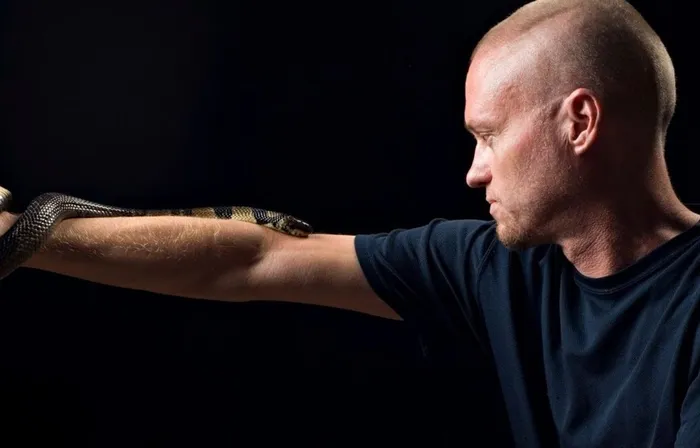Bitten by snakes 200 times: How one man’s blood could lead to a universal snake antivenom

Mr Friede’s extreme actions, initially meant to protect himself while handling snakes, have evolved into a scientific pursuit with global implications.
Image: YouTube
A man who has spent nearly 20 years deliberately injecting himself with snake venom may hold the key to a game-changing antivenom that could benefit regions like South Africa, where snakebite injuries are a serious public health issue.
According to the BBC, Tim Friede, a former truck mechanic from the United States, has endured over 200 snakebites and injected himself more than 700 times with venom from some of the world’s deadliest snakes.
Scientists say that antibodies found in his blood have led to an “unparalleled” antivenom, offering a promising step toward a universal treatment for snakebites.
A dangerous mission turned into a medical breakthrough
Mr Friede’s extreme actions, initially meant to protect himself while handling snakes, have evolved into a scientific pursuit with global implications.
His efforts have captured attention for years on YouTube, where he shared videos of his venom experiments. But the stakes were always high. He admitted that early mistakes nearly cost him his life, saying he had “completely screwed up” after suffering two cobra bites in quick succession that left him in a coma.
Despite the risks, Friede’s motivation was clear: “It just became a lifestyle and I just kept pushing and pushing and pushing as hard as I could push—for the people who are 8,000 miles away from me who die from snakebite,” he explained.
The search for a global antivenom
Current antivenoms must be tailored to the specific species responsible for a bite, making them less effective in cases of misidentification or in areas where multiple venomous snakes are present.
There is even variation within a single species – antivenom developed for snakes in India, for example, may not work as effectively on the same species found in Sri Lanka.
This limitation led scientists to begin hunting for what are known as broadly neutralising antibodies – immune defences that target shared elements across venom types, rather than what makes each venom unique.
That’s when Dr Jacob Glanville, CEO of biotech firm Centivax, heard about Friede’s case.
“Immediately I was like ‘if anybody in the world has developed these broadly neutralising antibodies, it’s going to be him’,” said Dr Glanville. He reached out to Friede, asking to obtain blood samples – a request Friede agreed to.
The study received ethical approval as it only involved drawing blood, not further venom injections.
The science behind the serum
The team focused on elapids – a family of venomous snakes that includes mambas, cobras, coral snakes, taipans, and kraits. These snakes produce neurotoxins that can cause paralysis and death by stopping respiratory muscles.
Nineteen of the world’s deadliest elapids, as listed by the World Health Organization, were used in the study. From Friede’s blood, scientists isolated two broadly neutralising antibodies and combined them with a drug that targets a third type of neurotoxin, creating a powerful antivenom cocktail.
In trials on mice, this cocktail protected the animals from lethal doses of venom from 13 out of the 19 species tested and provided partial protection from the remaining six. Dr Glanville described the findings as showing “unparalleled” breadth, potentially covering elapids for which there is currently no antivenom.
The future of snakebite treatments
The researchers are now working to improve the formulation by refining the antibodies and exploring the addition of a fourth component.
Their long-term goal is to develop a universal antivenom, or at least separate injections for elapids and vipers, which are the other major venomous snake family. Vipers rely more on haemotoxins that attack the blood, as opposed to neurotoxins.
Professor Peter Kwong of Columbia University, who is part of the research team, believes that “in the next 10 or 15 years we’ll have something effective against each one of those toxin classes.”
He praised Friede’s immune system for its “extraordinary” response, which enabled it to recognise a wide range of venom components.
Experts cautiously optimistic
Professor Nick Casewell from the Liverpool School of Tropical Medicine said the breadth of protection achieved is “certainly novel” and represents a “strong piece of evidence” that this approach is feasible.
However, he cautioned that significant testing remains before any human applications are possible.
Still, for Friede, the outcome so far has been deeply meaningful. “I’m doing something good for humanity and that was very important to me,” he told the BBC. “I’m proud of it. It’s pretty cool.”
IOL News
Get your news on the go, click here to join the IOL News WhatsApp channel.
Related Topics:
